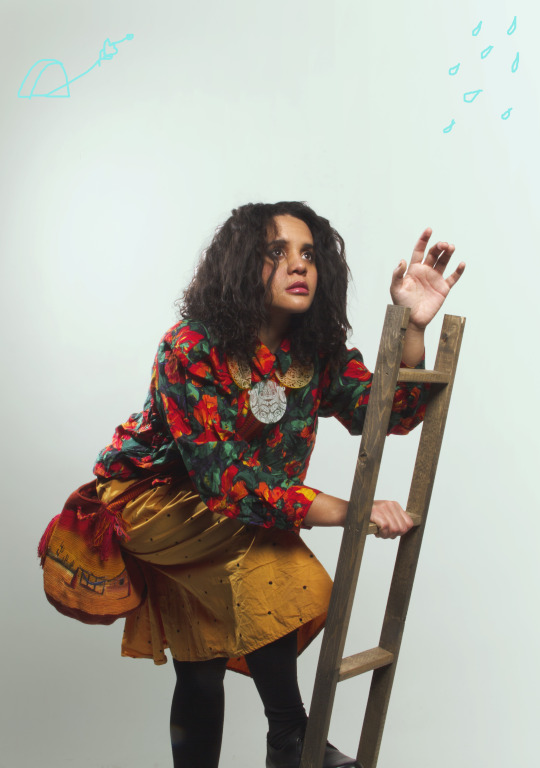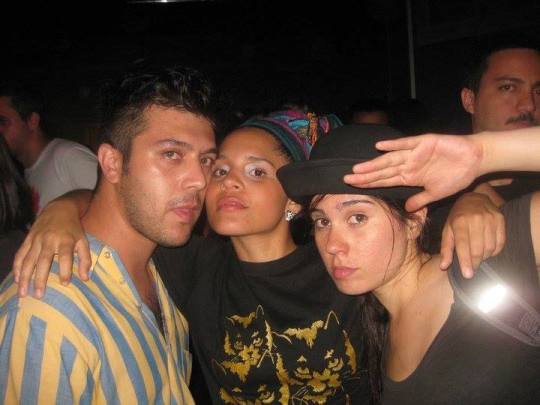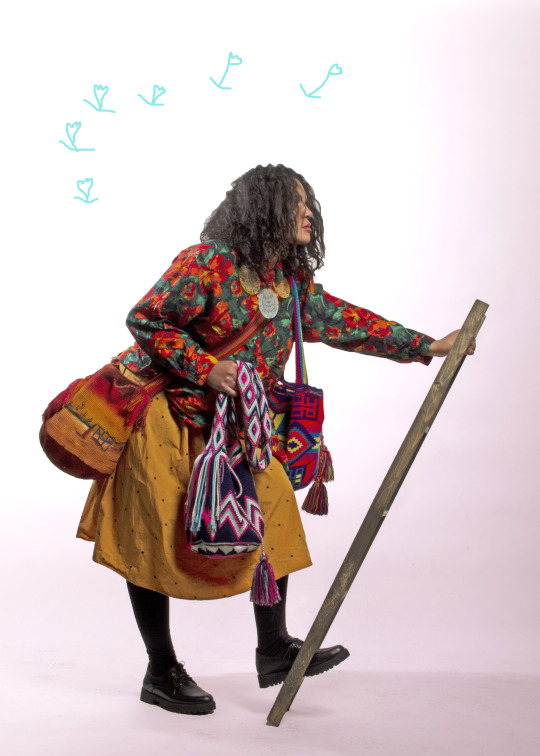 |
| Photo by Ruthie Titus @ruthtitus |
Part 2 of our conversion with Lido Pimienta. Click HERE to revisit the first part and stream her newest single, "Agua."
***
Souad Martin-Saoudi: How’s the Toronto community and your creative crew? Could you tell us about your Bridges series?
Lido Pimienta: I have a big crew. From musicians, to visual artists, to fashion designers, to galleries, to festival organizers, to critical thinkers, to DJs. Toronto is an amazing place to be, and despite the inevitable hetero-patriarchy and racism one faces here on the daily, I mean, I am just another POC on colonized land… despite that stuff, Toronto is fertile, and wonderful people like David Dacks from The Music Gallery, Sergio Elmir aka DosMundosRadio, LAL aka UNIT 2, Xpace, and many other organizers have shown me incredible support, not just by liking my photo on facebook, but by actually putting money behind and providing a space for my ideas to flourish. Ideas like my arts/music festival Bridges, whose mandate is to bring artists from South American diaspora working in a similar ways as an artist in Canada. We’ve had Isa Gt, Conector (Aterciopelados), Zuzuka Poderosa, Tanya Tagaq, Boogat and many other performers grace our stage - I get support for the many workshops and curatorial projects I produce. I should also shout-out the Toronto Arts Council, Factor, Canada Council and the Ontario Arts Council for the support. It would be impossible to attempt half the things I have been able to do without the times they have supported my initiatives.
SMS: You also have been referencing to Gangster pop as one of your genres. I would like to know more about that label, and what it represents to you.
LP: I am interested in taking words with a negative connotation, and shift their meaning and apply to them my vernacular. The words slut, bitch and whore have hurt me so much in the past. Now I embrace and encourage all my bitches to slut it up and be all the hoe-self their heart desires, and this is a movement that Black Feminists lead, like anything good in the world of course. So, because I know people expect me to be this “cute,” or “child-like” singer, I like the idea of labeling myself as something I see fits more like, “satanic pop” or “gangster pop.” There is nothing that gives me and has given me more disgust than when I get labeled as “world music,” it is such a simplistic, racist and lazy label. No thank you. I am “Satánica” !
SMS: When you write, who do you write for? For yourself, or do you write with your audience in mind?
LP: I'm still trying to figure out who my audience is. I don’t write for anyone else but myself. My heart is wounded, so I know the feeling is familiar to the world. So my experience will resonate, no matter what I say, no matter what I do. I keep WOMXN in mind, I keep single mothers in mind, I keep youth in mind and womxn in South America who have no access to safe abortions, I keep Indigenous and Black womxn in all of the Diasporas who are fighting to stay alive. Color was about that too, but the person singing those chants was more hopeful. La Papessa is hurt. She is LOVE, but she is also PAIN. She is light, but she also is comfortable in darkness.
SMS: And when you collaborate with others?
LP: When I collaborate with others, Lido leaves the room. I enter the world of my collaborators completely. For instance, “Jardines” was a hymn inspired in the world of Chancha Via Circuito. I ask, “what is the vibe, what is the title, what mindstate were you in when you wrote the music?” and I go from there. “Un jardin, comienza con una semilla...” it is very hippie, very kind, very generous, like Chancha is. “Reza Por Mí” is a love song. I cannot write love songs for Lido Pimienta...I write songs about pain, about heartbreak, but in that song for Atropolis, the beat was so light, and beachy... I had to, I just had to.
The same for Capullo in “A Quién Amas En Realidad Es A Mí.” I understand Capullos' aesthetic, I knew their style could be complemented by something raw, but funny and witty, with Pop Culture AND colloquial lengua “todo lo que tenía puesto era de segunda, pero mi ropa interior si era nueva.” I mean... I feel I have written more songs for other people than I have in my own catalogue, but I step out and get inside the brain of whoever wants to collaborate. Sometimes it doesn't stick. On Javiera Mena' “Luz de Piedra de Luna,” I wrote a part: “navegando galaxias, por un camino estelar, con luz de piedra de luna, tu tienes el poder,” but she decided to just keep the harmonies, and that's totally fine. When you write something for someone else, you are just another instrument, I am lucky that 99% of the time, people let me be free.
 |
| Lido with Gepe & Javiera Mena |
SMS: In an interview you gave to Now in late January, you said that you felt like everything you could possibly do in Toronto, you had done, and that you were tired of having these conversations – conversations about what it’s like to make music as a racialized performer in a “multicultural Canada” where you are granted support and exposure at the expense of a token status – and seeing that things don’t change; you added that your next step was going back to South America, the States and Europe. I would like to hear more on that! I’m interested to know how you apprehend the international reception of your work. How do you tackle tokenism and deconstruct stereotypes?
LP: I would like to think that people book me and want me because I am damn good. But I also know that some bookers and promoters, get me in their bills because they got a government grant, and they can check one of many boxes when they book me. Woman: check. Minority: check, and so on. It is difficult as well, because it is in Canada and USA that I find the most support now, when it used to be in South America. Rarely I get emails from South America or Mexico anymore. But I also know that this is my fault, I have not dropped a new album, or song in a long time. I feel as though people have me in their collective/nostalgic memory. Also, music industry is one of the most competitive, depressing, problematic, desperate industries. The people who used to be “my friends” don't have a use for me anymore. I can't give them personal emails and phone numbers or facilitate contact avoiding management or music shows anymore. I am not culturally valuable anymore, and I am fine with that. It is all part of my plan, to disassociate myself with any scenes, I want to be my own movement. I do miss having talks with some of the people from my 15 minutes of fame, but, the real relationships I was left with afterwards are there for me and I am here for them. It has been a crazy roller-coaster, but now I am ready to go back to music, wiser, stronger and with a better sound. A sound that is mine and unique, not to be fucked around with.
 |
| Photo by Ruthie Titus @ruthtitus |
LP: The failure is evident when we look around and observe how media is still whitewashed. As Canadians, we live in a “multi-cultural” society, but we know this is wrong. The “better” term should be “pluri-cultural”, we do not mix. The latinx crew, hang with their own, although we are starting to be more aware and intersectional, the Korean with their crew, and so on. The white people, you know, they have their vanilla with white chocolate chip fest, and they come to our “world music” events with their sun cream and sandals with socks combos. To me, the one truly diverse groups or spaces are those who are led and organized by QTPOC folk. You go into those spaces or party with them, and you truly see, a sneak peak of what a multi-cultural society ought to look like.
It is utterly disturbing to me, when I look at the state of “pop” music in South America. The emulation of “white culture” makes me want to vomit. I mean, youth culture is global, I get it, but also, the magnificent element that we as Afro-Indigenx-Spanish carry, is that exactly, our mix, our multilayer influences and narratives. I love it when someone like Gepe goes ahead and gets Wendy Sulca to play, its so wild and whimsical! That is what music is all about.
There is this wrong impression that white people created “rock and roll”, Rock and Roll was pioneered by a Queer Black woman, her name was Sister Rosetta Tharpe. We look at rock-pop now, and most people in that genre idolize The Beatles or The Rolling Stones, who by the way, just stopped by Colombia, they probably filled an arena. I mean… It is really a pathetic affair when a dinosaur pays you a visit after they've been dead and irrelevant for centuries. All of this to say, that we are ignorant to HERstory, and it is this simple fact that makes me want to leave Canada and go back to my roots, be in Colombia and play with my sheroes, the real rocks stars, Petrona Martinez, Martina Camargo, Sexteto Tabala... I mean... the day that they fill an arena in Colombia… is the day I will have no sorrow in my heart.
SMS: I’m curious about your self-care rituals. Would you care sharing them with us? You’ve been posting some pictures of your tejido apprenticeship and work on Instagram. Is it part of your self-care ritual?
LP: Tejidos are in my blood. My family is Indigena Wayuu. Weaving is in our DNA, and I weave because it is relaxing, helps me think. I just broke up with a friend of 8 years, her leaving my life was painful, traumatic but necessary. Weaving helps me bury the bad memories and begin a new story.
Self Care by Lido Pimienta:
1. Hair: wash every two days, brush every night and put in a high bun to help it grow
2. Face: wash with warm water and dry with face cloth, not body towel
3. Skin: coconut/shea butter
4. Butt/thighs: mix coconut oil with coffee grind (avoids cellulite and energizes)
5. Sex with your partner or yourself regularly, orgasm always. DO NOT FAKE IT.
SMS: About your promo single “Agua,” water has always been full of symbolism: birth and death, women, mother, purity… many rites are attached to it. What is your relation to water?
LP: My obsession with water began in Colombia, I could swim before I could walk. I was always swimming back home. River water, ocean, lake, pool... Water. There is crisis in La Guajira. This song is about rescuing water, giving her a song - canto - al - agua - to protect her, so that she can protect us. I am starting my own campaign, by the way. Here is the promo:
